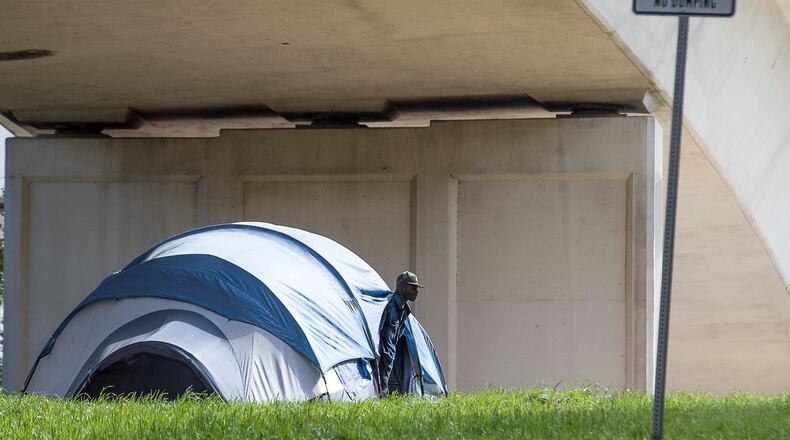As winter approaches and nights get colder in Atlanta, the city is allocating $18 million in federal relief funds toward a new program that aims to move hundreds of homeless individuals into their own apartments across the metro area.
During a press conference with local media Wednesday, Mayor Keisha Lance Bottoms announced the “robust housing initiative” aims to help up to 800 people currently living on Atlanta’s streets and at homeless encampments.
The effort is being led by Partners for Home, the nonprofit that heads up the city’s homelessness strategy. The organization has already begun visiting homeless encampments and shelters to find people that need housing and is working to find them an apartment and pay their rent, said Cathryn Marchman, the executive director of Partners for Home.
The nonprofit will arrange one-year leases for many of the individuals and pay the rent directly to landlords. Marchman said the program goal is to lease 800 apartments.
“There’s no question this is the most aggressive, the most ambitious, monumental initiative that I’ve ever seen, that we’ve ever launched,” Marchman said Wednesday. The program will target people who are chronically homeless, on the verge of being chronically homeless or anyone between 18 and 24 years old and facing homelessness.
“Extensive street outreach efforts are underway to identify and assess individuals experiencing homelessness," said Bottoms, who also chairs a task force set up by Gov. Brian Kemp focused on homelessness issues during the pandemic.
Outreach workers recently visited a homeless encampment off Pryor Street and moved 82 people staying there into a nearby hotel, Marchman said. They are all set to be placed into housing through the new program.
So far, Marchman said individuals living at encampments have been open to the assistance the new program provides.
“Generally speaking, most folks who are otherwise declining services or shelter are very willing to entertain an apartment with a lease in their name ... and a roof over their head,” she said, adding that they have had success with reducing homelessness through previous rehousing programs. Those who are part of the program will also be connected with a case worker from a local agency who will work with them and make sure they have the support and resources they need as they transition into an apartment.
To reach the goal of 800 apartments, the city needs to secure another 342 units, preferably by the end of the year. Marchman predicted that would be the biggest challenge moving forward. Marchman said they have secured about 120 units and are in talks with landlords for another 340 units.
“More than anything, we need landlords who are able to lower barriers to entry,” she said.
Much of the funding for the initiative, about $18 million, is coming from federal coronavirus relief the city received when the pandemic hit. Partners for Home also plans to add an additional $6.5 million from private philanthropic contributions.
Since coronavirus hit, many have grown worried about the health of Atlanta’s homeless population, and whether more would become homeless after falling on hard times. The city and its homeless providers launched aggressive efforts to test every person living in Atlanta’s homeless shelters, and placed some unsheltered people in local hotels. But city officials said they would not clean out homeless encampments unless they could ensure those individuals had a place to go.
The number of homeless people in Atlanta has remained “largely flat” over the last year, Marchman said. During one night in January, Partners for Home counted 3,240 people living in homeless shelters or on the streets, a nominal increase from 2019. However, they recorded a 31% increase in Atlanta’s unsheltered population.
Some shelters have reported decreases in intake since the pandemic began, Marchman said, but many have noticed an increase in people sleeping on Atlanta’s streets.
“Some of our encampments have mushroomed,” she said, adding that “this housing surge is really going to position us well to make a pretty significant impact there.”
Landlords in metro Atlanta who are interested in participating in the program can email listings@opendoorsatl.org or call 470-222-3213 for more information.
About the Author
Keep Reading
The Latest
Featured



